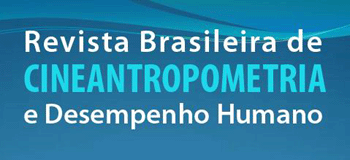Abstract
The aim of this study was to compare the maximum oxygen consumption (VO2max) between road cyclists with and without risk for eating disorders. The sample was composed of 43 cyclists aged 18-25 years, participants of the road cycling championship of the State of Pernambuco. VO2max was measured by a computerized metabolic analyzer during an incremental test in cycleergometer. The initial test load was 50 W, with increments of 25 W every minute until volitional exhaustion or inability to maintain the current load. To evaluate disordered eating behaviors (DEB), the Eating Attitudes Test was used (EAT-26). Univariate analysis of covariance (ANCOVA) was used to compare the VO2max between cyclists with (EAT-26 ≥ 21) and without (EAT-26 < 21) risk for eating disorders. The findings showed statistically significant VO2max difference between cyclists with and without risk to eating disorders (F (2,41)=28.44; p=0.01), indicating moderate effect size (d = 0.6). It was concluded that DEB was related to cyclists with lower VO2max.
Key words
Cycling; Physical endurance; Sport medicine

